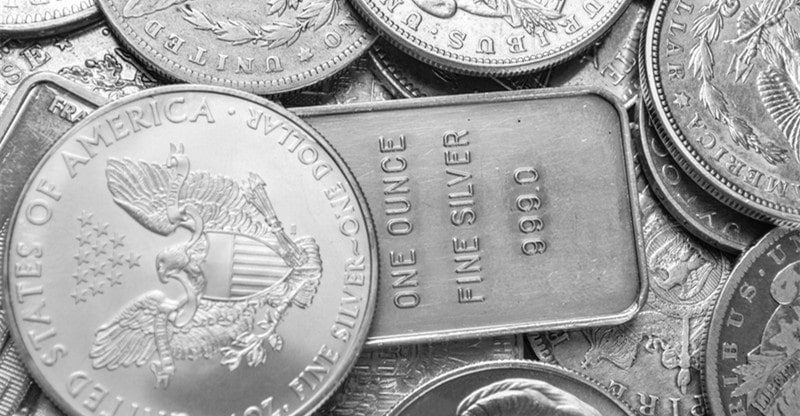Should I Buy Silver Bullion Or Silver Coins?
Investing in precious metals is often a great way to diversify your portfolio. In uncertain economic times, investing in metals can be a smart way to create financial security, as it’s not dependent on the value of the dollar.
Silver is a precious metal that’s both valuable and affordable. Given its use in many industries, including currency, silver is in high demand. An investor looking to diversify their portfolio, store wealth, or protect themselves against inflation may want to invest in silver.
But what silver should you invest in? Silver is bought and traded as silver bullion, such as rounds or bars, and silver coins. Should you buy silver bullion or silver coins? Is there an advantage to one over the other? Let’s look at the differences and any advantages between silver bullion and silver coins.
Silver Rounds
Silver rounds are similar to coins except they’re not struck by a sovereign mint and don’t have face value nor legal tender status. They’re valued by weight and come in a variety of weights and designs, making them appealing to collectors. One of the primary advantages to silver rounds is that they’re typically the most affordable.
When deciding which form of silver to invest in, there are many factors to consider. If you’re a new investor, cost may play a major factor. Silver rounds are an affordable way to start investing in precious metals and may be a good starting place.
Silver Bars
Like coins, silver bars are valued by weight and don’t carry legal tender. They’re formed as ingots or cast/hand-poured bars and can be struck by both silver government mints and private silver mints, though the majority are struck by private mints. Silver bars are offered in a variety of sizes, weights, designs, and finishes.
Aside from preference, choosing a particular weight may have different advantages. A smaller bar may initially be easier to liquidate but has a higher “premium over spot” when buying.
Conversely, larger bars are considered to have the best value when buying due to their lower premium above the spot but can be harder to liquidate. But that shouldn’t deter you from investing in bars in general. Silver bars have been a cornerstone for investing in precious metals particularly because of their liquidity.
Advantages of Silver Bullion
Typically, silver bars cost less per troy ounce than silver coins. Choosing which form of silver you prefer to invest in will depend on what your overall objective is. It’s best to have a clear idea of what your goals and priorities are with your investments.
If your priority is to obtain as much silver bullion weight as possible for your flat currency, then buying bars or rounds will generally be a better option for you than silver coins.
Silver bars have lower production costs, which decreases the cost per gram of making them compared to silver coins. Lower cost is a primary benefit when choosing to buy silver bullion.
Because of the escalating price of gold due to economic decline, the price of silver is currently about 113 times lower than the price of gold. This is a larger gold-silver ratio than it has been in recent history, making silver bullion the most affordable option for investors.
Silver Coins
Silver coins are the most popular form in the precious metal market and are highly liquid. They’re struck by a government mint and stamped with a face value. Contrasted to silver bullion, silver coins have a government-based face value determined by weight and purity and are considered legal tender.
Though silver coins cost more per troy ounce than silver bullion, they have a higher recognition within the market, making them easier to sell and trade. Additionally, government minting provides a guarantee of their quality, also making them easier to liquidate than bars and rounds.
Advantages of Silver Coins
Since silver bullion bars tend to be harder to sell back than coins and have higher transaction costs, coins have the potential to bring in a larger premium than bullion when it comes time to sell. Simply put, bullion bars and rounds will yield less.
Another advantage is that coins are both a store of value and a medium of exchange. If the value of silver drops lower than the face value of the coin, the coin still retains face value and can be spent as legal tender. In financial difficultly, the coins can be used as currency. This doesn’t hold true for silver bullion, which is not legal tender and is affected by fluctuating spot prices.
Additionally, many investors prefer to purchase coins because they’re capital gains tax (CGT) exempt.
So Which Should I Buy?
When considering whether you should buy silver bullion or silver coins, you must weigh all the contributing factors. These can include, but are not limited to, the silver price per troy ounce, recognition, purity, silver quality guarantee, unit sizes, and liquidity.
There’s no definitive answer to which is the better choice. Making the “right” selection may be subjective and depend on each individual investor’s preferences and goals. Often, investors will choose a mix of both to diversify.
However, there are some differences you may choose to consider when weighing your options. Coins have an appeal to two markets, the investor and the collectors. Coins can also appreciate in collectability value: look for low-mintage or scarce coins. On the other hand, bars are easier to store and more affordable; you can get more silver per flat fee.
If you’re uncertain which form of silver is the best choice for your individual needs, contact our professional team at Swiss America. Our account executives and support staff are available to answer any questions you have. Our team is ready to help you make the most of your investment.
Whether you choose to buy silver bullion, silver coins, or a mix of both, investing in silver is a smart and affordable choice to help you diversify your portfolio and establish financial security.



